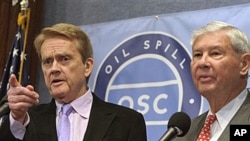Nearly nine months ago, the world was shocked when an oil rig off the gulf state of Louisiana exploded, killing 11 workers. What was to follow became the nation's largest oil spill with more than 4 million barrels of oil entering Gulf of Mexico waters. President Barack Obama appointed an oil spill commission to examine the cause and suggest future prevention plans.
One woman, whose son was killed in the explosion, said, "It's hard knowing that he's never going to be here with us, you know? Our lives will never be the same again."
The spill spewed more than 4 million barrels of oil into the Gulf and decimated a $1billion fishing industry, affecting residents of the southern state of Louisiana.
"We want to shrimp," said one woman who fishes for a living. "Get the oil out of here and let us shrimp."
Placing blame
A presidential commission investigating the causes placed the blame with the three companies connected to the oil well. Co-Chair William Reilly, former Environmental Protection Agency Administrator, issued a global warning.
"We have evidence that suggests Halliburton, Transocean, and BP - all of which operate throughout the world, in virtually all oceans - they all made serious mistakes on the night of April 20th that should cause those who work with them to be very careful," said Reilly.
The commission says the deadly explosion and massive spill could have been avoided and the commission concluded that the oil and gas industry need to do more to prevent a future disaster.
Reilly and co-chair, former U.S. Senator Bob Graham, sat down for an interview with VOA the day before releasing their report. They were blunt in their assessment of the entire oil industry. Without change, they say it could wither, similar to nuclear energy following the Three Mile Island incident in 1979.
Complacency and shortcuts
"I was surprised to learn that the industry itself was so complacent with its commitment to safety," said Graham. "I was also surprised to know how much more risky it is to be drilling at 5,000 or 10,000 feet, than it is to be drilling at 500 feet."
Graham said more oversight is needed for deep-water drilling as it spreads across the globe, with plans to drill off Brazil, Mexico, Cuba, and with increased demand for oil by India and China.
The report says BP, Halliburton, and Transocean cut costs and took shortcuts, which increased the risk of a blowout. It specifically singles out a flawed design of the cement used to seal the well. It underscores the misreading of a final negative pressure test on one seal. It points out inattention to blowout warnings and failure to accept the magnitude of the event.
Poor response
It also faults the companies for ineffective response once the disaster started. Here's what BP Vice President David Rainey said about the spill on April 21, the day after it happened: "If there is any pollution, at the moment we believe it's minor pollution."
Here's how BP responded Tuesday to the report: "We support the Commission's efforts to strengthen industry-wide safety practices."
BP also says it is committed to working with others to identify and implement changes.
Bolstered regulations
The commission suggests 80 percent of the fines and penalties imposed on the companies - estimated to be in the double-digit millions of dollars - goes toward restoration of the Gulf. It also calls for more government regulations to prevent this in the future. The co-chairs said there is an imbalance between the revenue brought in by oil and the regulations set up to monitor it.
"There has to be some deduction from these huge, multi-billion-dollar lease amounts, royalty amounts, to actually support the apparatus that keeps it all honest, that makes it all protective," said Reilly. "That has not been our history and has not been the history of many countries."
The mood here on Capitol Hill these days is for smaller government, fewer regulations. The co-chairs acknowledge that, but say they hope legislators vividly remember the disaster and make an exception.










